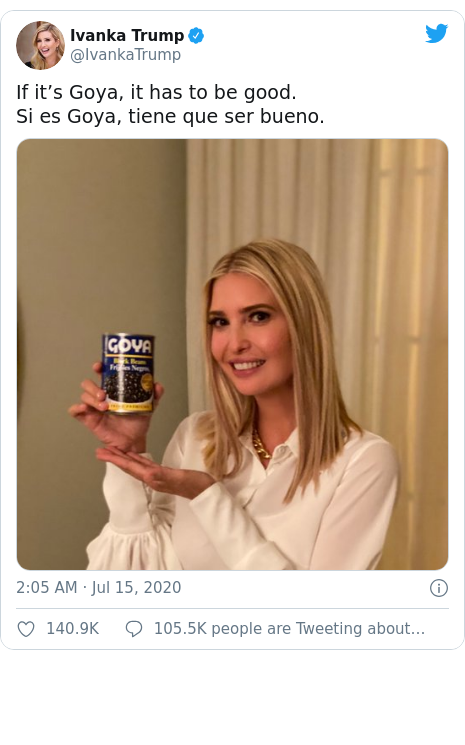


For Businesses Caught in the Crosshairs, Social Media Boycotts Mean More Than a Hill of Beans
By Thom Fladung, Hennes Communications
Goya Foods President Bob Unanue recently went to the White House to announce a large donation by his company to food banks across the country – 1 million cans of chickpeas and an additional million pounds of food. With such a quintessential good news story, what could go wrong?
Here’s what: During his visit, Unanue offered that President Donald Trump is an “incredible builder” and that the United States is “blessed” to have Trump as its leader. In the days that followed, anti-Trump forces bombarded social media with a call for a boycott of Goya products. The hashtags #Goyaway, #BoycottGoya and #GoyaGottaGo almost immediately began trending. Pro-Trump forces wasted little time launching a counterattack, or “buycott,” using the hashtag #BuyGoya. The president’s daughter Ivanka Trump took to Twitter to promote the Goya brand and to defend the company, as did the President himself.
“By the time Ivanka Trump tweeted an endorsement of Goya,” The New York Times wrote, “one thing had become clear: In a polarized country, at a polarized time, the buying of beans had become a political act.”
It’s not clear whether the boycott cut into Goya’s sales, the New York Times reported, or whether the counter “buycott” actually increased sales. The privately held Goya’s records are not public.
But whatever their political leanings – Unanue, a registered Republican, has contributed to both Republicans and Democrats – one can presume that Unanue and his employees are more interested in making and selling food than being caught up in the latest social media firestorm.
The Washington Post called the Goya controversy the “familiar cycle,” adding “When corporate executives or companies take controversial political or cultural stances, activists across the political spectrum often respond by calling for a boycott.”
And the companies and organizations suddenly caught up in controversies range from giants like Goya to the owner of a mom-and-pop bakery in Kent, Ohio, who posted a sign in her window promoting “patriotic disobedience” against mandatory masks and other public health orders. She later then relented and covered it up in the face of social media critics – and when a local TV news crew showed up.
As fellow crisis communications consultant Molly McPherson recently tweeted, “Pay attention: Consumer activism is on the rise. If someone is comfortable boycotting beans, they can boycott any biz.”
And guess where those boycott efforts are most frequently starting these days?
The Pew Research Institute recently reported that social media continues to grow in importance as a place to practice social and political activism – not surprisingly, particularly among younger people.
“About six-in-ten (58%) of those ages 18 to 29 say that social media is very or somewhat important for them when getting involved with political and social issues that are important to them,” Pew reported. Among older adults, 43% of those 30 to 49 feel social media is an important tool to express their political passions, while a smaller share (36%) of those 50 or older believe this.
What’s a business owner to do? Start with crisis communications and reputation management best practices for social media.
- We’ll repeat McPherson’s entreaty: Pay attention! If you’re not monitoring social media to see what people are saying about you, start. Another colleague, Richard Levick, chairman and CEO of Washington, D.C.-based Levick, has said you can often see boycotts coming: “You want to be tracking on the internet, not just Google Alerts but on social media to see if there is starting to be anxiety or anger over your company or your product.”
- Have a plan. If you are monitoring, great. But do you have a plan for how to react to attacks, negative posts or a boycott threat? Do you have a crisis communications team established in your organization to carry out that plan?
- Don’t let mistakes live on. Respond and correct misinformation about you or your organization in real time. Do not allow misstatements of fact or incorrect characterizations of your organization to go unchallenged.
- Don’t arm wrestle with trolls. Correct errors once. Resist the urge to get caught up in exchanges with rude or obnoxious people on social media. Don’t feel compelled to continue the conversation should the person then challenge you or your response.
- Pause before hitting “delete.” Resist the urge to delete negative posts to your official social media sites unless they are offensive (racial, profane, personal attacks, etc.). If you remove a comment, explain why.
- Go offline to get back on track. Offer to contact the person who posted a critical comment offline to resolve issues, as appropriate.
- Remember your audience. Always remember in responding on social media that you are speaking to the larger audience reading these comments, not that specific commenter.
Pew also reported that among younger social media users there have been double-digit increases “when it comes to getting involved with political or social issues and having a venue to express their opinions.”
Activism on social media isn’t a trend. It’s an increasing cultural shift. Is your business prepared?
Thom Fladung is managing partner of Hennes Communications. Find him on Twitter as @Fladung. Email him at fladung@crisiscommunications.com or call 216-213-5196.